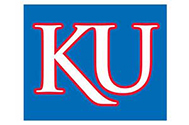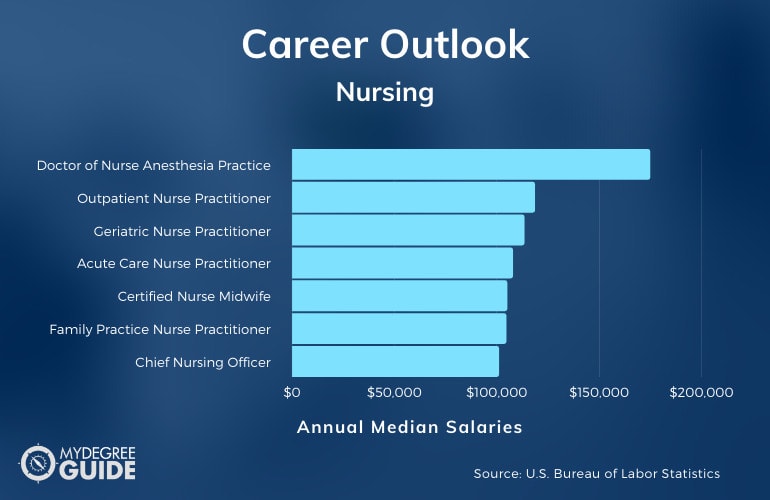Best Online Ph.D. in Nursing Programs – 2024


What Factors Were Considered for Ranking the Best Ph.D. in Nursing Online Programs?
Following are the 10 best online ph.d. in nursing programs in the nation for 2024, 1) university of central florida - orlando, fl.

If gaining knowledge and expertise in nursing research interests you, then pursuing an online Ph.D. can be a fruitful decision. The University of Central Florida offers two online Ph.D. tracks that can be completed without keeping your current work assignments on hold. So, there is BSN to Ph.D. track that requires completing 75 credit hours post-BSN, whereas, if you have completed a master’s in nursing, your coursework for the MSN to Ph.D. track demands finishing 60-credit hours. Except for two intensives that require few days of campus visits per year, all courses are offered through the web.
Upon completion of this program, you will be able to explore promising employment opportunities, such as the director of nursing research, nurse scientist, nursing faculty, and research scientist.
Key Highlights
• UCF’s College of Nursing is highly ranked by the U.S. News and World Report in recognition of its innovative and pathbreaking online education. • The college has the expertise of offering quality web-based programs for the last 20 years that are well supported by its experienced faculty.
2) Vanderbilt University - Nashville, TN

Specializations Offered:
Vanderbilt University’s online Ph.D. in nursing science prepares you for a career in nursing research and education. Depending on your career goals, you can choose from either Clinical Research or Health Services Research. If you are inclined towards improving health outcomes by researching treatments that involve physical, psychological, and educational therapies, then the clinical research specialization is better suited. Whereas, the health services research specialty is focused on designing systems that evaluate treatments administered, their costs, and what happens to the patient, after that.
The coursework requires completion of at least 57 credit hours and is delivered completely online, with some parts being synchronous and some asynchronous. Out of the 57 credits, 32 are core courses, 15 credits are to be completed in your specialty-specific courses, and ten credits are towards your research thesis. To participate in experiential learning and interactive sessions with faculty, you must visit the campus for around 15 to 20 days per academic year.
• Vanderbilt University offers Ph.D. students multiple opportunities to interact with research scholars across the university and the nation. • You will be taught by a faculty that is nationally recognized and actively participates in research in your chosen specialty. • Eligible students can transfer 15 credits from their master’s degree towards this Ph.D.
3) Walden University - Minneapolis, MN

If you are keen on positively impacting the future of healthcare by actively participating in research, teaching, and policymaking, then completing your Ph.D. in any of the tracks offered by Walden University can be given a thought. One of the sought-after Ph.D. in Nursing online programs in MN, you need at least a master’s degree to be eligible for this program. Acknowledging your past education, the college allows a transfer of up to 40 credits towards the Ph.D. With five tracks in education, healthcare administration, interdisciplinary health, leadership, and population health, you can opt for the one that matches your career aspirations.
Regardless of what specialization you choose, the degree requires completing a total of 81 credits, comprising 20 credits of research courses, 25 credits in core courses, and 15 credits in courses of your chosen specialization. The curriculum culminates with a research thesis of 20 credits. Upon completion of this Ph.D. in your chosen specialty, you can go on to work as either a nursing professor, head a research organization, or become a health policymaker in a health organization.
• If you have completed your DNP, you can opt for the DNP to Ph.D. Bridge program where you can transfer 26 credits and save considerable time and tuition costs. • With Walden’s Sigma Theta Tau chapter, you can network with other nurses and share your nursing research ideas and gain a broader perspective.
4) University of Kansas - Kansas City, KS

The University of Kansas has been offering Ph.D. education since 1983, and its over 125 graduates are successfully working as nurse educators and research scholars in various educational and healthcare organizations. Graduates are trained in the skills and advance art and science of nursing, with emphasis on critical thinking and evidence-based decision making. On average, students complete this online program in three years on a full-time basis.
Well, you can enter this program after your bachelor’s or upon completion of your master’s in nursing. With the master’s, you will require six fewer credits, whereas as a post BSN student, you must complete additional courses in theories for practice research and healthcare research as part of your Ph.D. curriculum.
The curriculum involves completing 52-credit coursework plus 15 credits of thesis, and there are three areas of specialization to choose from - Health Systems, Symptom Science, and Education. Well, to enhance your chances of admission into this or for that matter any other Ph.D. in Nursing online programs, ensure you earn a minimum GPA of 3.50 in your BSN or 3.25 in your MSN, apart from holding an active nurse license and demonstrating an aptitude for leadership and research activities.
• You will be able to select up to 11 credits of your total coursework in the topic related to your research thesis. • You can opt to be mentored by a graduate faculty who shares your research interests.
5) University of Arizona - Tucson, AZ

University of Arizona College of Nursing offers several pathways to Ph.D. aspirants. You can enter this program either post your BSN or MSN. Alternatively, you can also opt to complete your Ph.D. along with a DNP or even earn a Ph.D. after completing the DNP. Whichever path you choose, you can complete this program online, both on a part-time and full-time basis. Besides the online courses, you are required to attend a mandatory one week of on-campus orientation, where you will collaborate with peers and faculty to explore the Ph.D. curriculum.
This online Doctor of Philosophy in nursing is offered in three areas of focused study-Precision Science, Health Determinants Science and Data and System Science, out of which you must choose one. This study constitutes 12 credits of your Ph.D. coursework and helps gain specialized knowledge in your area of focus. The total Ph.D. curriculum requires completing 64 credits. The coursework includes an 18-credit dissertation that is completed over multiple terms.
• The college is among the top nursing schools in receiving funding from the NIH. As a potential student, you will certainly benefit from the school’s dynamic research profile. • The school’s stellar faculty is accomplished, and they engage in research and scholarly activity in all the three areas of focused study.
6) Indiana University - Bloomington, IN

Indiana University’s online Ph.D. training prepares you for a career in private or public organizations as nursing faculty, director of clinical research, and director of clinical services. The program is grounded in nursing science and offers concentration options in Clinical Nursing Science and Health Systems. Clinical Nursing Science is ideal if you are inclined towards the research of prevention and early detection of diseases and disabilities across the lifespan, whereas Health Systems emphasizes on informatics, nursing education, and public health policy.
You can enter this program, either after your BSN or post an MSN. While the former requires completing 90 credits, the latter is shorter and requires just 60 credits as 30 credits are automatically transferred from the MSN towards your Ph.D. While most of the courses are offered online, you require attending two campus intensives per year. These visits can be enriching as you get the opportunity to network with mentors and other experts from the field. The curriculum is well balanced, covering courses in nursing science, biostatistics for public health, data analysis, and quantitative research. The coursework ends with a 16-credit thesis in nursing.
• If you are a resident of Indiana, you can complete this program at only one-third of the tuition cost that out of state students incur. • As an online student, you will be taught by the same faculty that teaches on-campus. Moreover, didactic sessions are synchronous in nature, so you practically land up in a virtual classroom with your peers, taking classes through videoconferencing.
7) University of Colorado - Denver, CO

If you are looking at a career in nursing education, nursing administration, or nursing research, then the University of Colorado’s nursing Ph.D. can be considered. You can enter this program, either after completing a BSN or MSN. Depending on professional interests, you can choose from any of the three areas of focus - Health Care Systems Research, Caring Science, and Behavioral Sciences. Although all courses are offered via the internet, however, you must be prepared to travel to Denver once every semester for the on-campus intensives.
The 60-credit Ph.D. coursework includes 18 credits of dissertation. On a full-time basis, you can complete this program in three years. As a pre-requisite to this program, you must complete a graduate-level course in statistics. Upon completion of core and specialization courses, you will demonstrate the expertise of developing new knowledge and findings through your nursing research.
• You are eligible for in-state tuition costs if your permanent residence address happens to be in any of the 15 states that include Alaska, Arizona, California, Colorado, Hawaii, Idaho, Montana, Nevada, New Mexico, North Dakota, Oregon, South Dakota, Utah, Washington, and Wyoming. • Eligible Ph.D. students can also avail scholarships that the college offers twice a year.
8) Villanova University - Villanova, PA

If you are looking at an online Ph.D. in Nursing program to attain the highest nursing degree, then you could consider Villanova University’s Ph.D. that prepares you to conduct clinical and educational based nursing research towards better nursing practice and education. This advanced credential will help you climb the career ladder in the academic field by preparing you to take up leadership positions in the higher education arena. With flexible schedules, you can complete this program in as little as two years or stretch it to three to four years. An additional two years are required for the completion of the nursing thesis.
The curriculum entails completing 51 credits; however, the exact number of credits may vary, depending on your past education. The coursework is designed to equip you with the practical and theoretical understanding required to create new knowledge of culturally relevant nursing practice and education. You will also learn to collaborate with members of other health disciplines to enhance your research.
• This Ph.D. program at Villanova is known for the personalized study experience it offers students. • Year after year, the National League for Nursing has honored the college’s Nursing School as being the Center of Excellence in Nursing Education, a testimony of the quality nursing education it offers.
9) Duquesne University - Pittsburgh, PA

The Ph.D. program being offered by Duquesne University since 1994 has trained over 100 graduates who are currently well established in their careers as nurse scientists. Primarily offered as a post MSN course, there is also a post-DNP track that can be completed in 2.5 years as it requires fewer credits. The Ph.D. program at Duquesne is mainly focused on preparing you for nursing research in addressing the health needs of the vulnerable and underserved populations that are economically backward and belong to racial or ethnic minorities.
To be eligible for this program, you must have earned a master’s, preferably in nursing, with a minimum GPA of 3.50. There is a three year and four-year track to choose from. The three-year track is rigorous and will hardly leave you any time for other commitments, whereas with the four-year track, you will be completing your coursework at a comfortable pace, typically taking six credits per semester, unlike the 6-10 in the three-year track. Both tracks require a graduate-level statistics course as a pre-requisite. The 53 credits curriculum includes 12 credits of a dissertation that takes place during the last year of your coursework.
• Residency requirements in this program include visits to the college campus, and as part of the Methods of Scientific Inquiry course, you will take part in a 10-14 day international trip to locations such as Dublin, Ireland, where you will be provided with housing at the college’s campus. • The program enjoys the distinction of being the first online Doctor of Philosophy in nursing program in the country.
10) University of Missouri - Columbia, MO

University of Missouri’s Ph.D. in Nursing prepares you for an advanced career in nursing, either as a scholar, educator, or clinical researcher. Due to its interdisciplinary approach, even non-nursing students can enter this program. To pursue this degree, you have three pathways; post-BSN, post-MSN, and post-DNP. Regardless of the pathway you choose, you will be taught by a faculty that comes from diverse academic backgrounds, bringing in their interdisciplinary experiences and knowledge.
This Ph.D. is offered in a hybrid mode, requiring few campus visits while taking the majority of your coursework online. There are three focus areas to choose from; innovations to improve health and health systems, health improvement of the vulnerable population, symptom, and behavior science. The post-BSN track requires completion of about 77 credits, whereas, the post-MSN and post-DNP require 56 and 48 credits, respectively.
• One of the few military-friendly online Ph.D. in Nursing programs in the nation, military personnel, veterans, and their eligible family members can avail of a 10% reduction in tuition costs. • You can benefit from the nursing school’s research connections across its various departments that include social work, public health, human development and family science, education, and health informatics.
- Accelerated BSN Programs
- BSN to DNP Programs
- DrPH Programs
- Family Nurse Practitioner Programs
- Masters In Gerontology Programs
- Nurse Practitioner Programs
- PhD in Nursing Programs
- Physician Assistant Programs
- RN to BSN Programs
50 Best Online PhD Nursing Programs [2025 Guide]

Looking for Online PhD Nursing Programs for 2025? Compare PhD vs. DNP and see which doctoral nursing program is the best fit.

With your Doctor of Philosophy (PhD) in Nursing or Doctor of Nursing Practice, your job prospects are positive with a projected faster than average job growth rate of 45%, according to the Bureau of Labor Statistics.
Editorial Listing ShortCode:
List of Schools Offering Online PhD Nursing Programs
Methodology: The following school list is in alphabetical order. To be included, a college or university must be regionally accredited and offer degree programs online or in a hybrid format.
1. Boise State University
Established in 1932 by the Episcopal Church, Boise State University is located in Boise, Idaho.
The 8-semester DNP (Doctor of Nursing Practice) in Leadership program is a flexible, online course delivered in a cohort model with other Master’s prepared nurses across the country. There are 4 on-campus Orientation/Executive sessions. Students take 5-6 credits per semester.
- Doctor of Nursing Practice in Leadership
Boise State University is accredited by the Northwest Commission on Colleges and Universities.
2. Clarion University
Founded in 1867, Clarion University is located in Clarion, Pennsylvania.
The DNP course is a consortium program between the Edinboro and Clarion Universities. The online, 27-credit-hour, affordable Clarion and Edinboro Universities program is flexible and can be customized to match the student’s interest.
The courses can be taken over 5 semesters in a part-time format.
Doctor of Nursing Practice
Clarion University ‘s programs are accredited by the Middle States Commission on Higher Education.
3. Delta State University
Located in Cleveland, Mississippi, Delta State University was established in 1924.
The online DNP program is offered by the University’s Robert E Smith School of Nursing. There are different options for Registered Nurses, Post-Master’s FNP, and Post-Master’s non-FNP students, each with different credit hour requirements. Part-time options are also available.
Delta State University is accredited by the Southern Association of Colleges and Schools Commission on Colleges.
4. Duquesne University
Located in Pittsburgh, Pennsylvania, Duquesne University is a Catholic university established in 1878.
The online DNP program is ranked #83 for Best Nursing Schools for DNP in the country by U.S. News & World Report. It has three start dates in the year, and there is no GRE requirement.
There is an option to study abroad at Duquesne’s Rome and Dublin campuses. Other programs include PhD Nursing and PhD Nursing Ethics.
- PhD in Nursing
- PhD in Nursing Ethics
Duquesne University is accredited by the Middle States Commission on Higher Education.
5. East Carolina University
Established in 1907, East Carolina University is located in Greenville, North Carolina.
The online/hybrid 36-semester hour DNP program provides two pathways to attain the degree – post-master’s and post-baccalaureate. Students are required to attend 1-5 day on-campus sessions at the beginning of every semester.
There are 5 core courses and 4 DNP project courses apart from the electives.
- Doctor of Nursing Practice (Hybrid)
- PhD in Nursing (Hybrid)
East Carolina University is accredited by the Commission on Colleges of the Southern Association of Colleges and Schools.
6. Georgia College & State University
Georgia College & State University is located in Milledgeville, Georgia. It was founded in 1889.
The 95% online DNP program comprises 37 semester hours and 540 clinical hours. The program includes a mentored capstone project that focuses on translational and clinical research. The program can be completed within 7 years.
Georgia College is accredited by the Southern Association of Colleges and Schools Commission on Colleges.
7. Georgia Southern University
With its flagship campus in Statesboro, Georgia, GSU was established in 1906.
The 100% online only DNP program is spread over 6 semesters, with flexible schedules. Students can take 2-3 courses per semester, and the curriculum requirement is 37 credit hours. There are 9 electives offered in the program.
Georgia Southern University is accredited by the Commission on Southern Association of Colleges and Schools Commission on Colleges.
8. Hampton University
A historically black university that was established in 1868 by black and white leaders, Hampton University is located in Hampton, Virginia.
The post-master’s degree DNP program is delivered 100% online and requires a minimum of 33 hours of coursework (each course: 16 weeks) and 500 clinical hours. There are 3 campus residency sessions. The program can be completed in 2 years.
Hampton University is accredited by the Southern Association of Colleges and Schools Commission on Colleges.
9. Illinois State University
Located in Normal, Illinois, Illinois State University was founded in 1857.
The 34-hour online DNP program can be completed across 7 semesters and includes 18 hours core courses, 3 hours applied data analysis and management, 6 hours clinical residency, and 7 hours of a scholarly project.
Post-baccalaureate students must complete 1,000 hours of clinical work. International students must submit a Credentials Evaluation Service Report and English proficiency scores.
Illinois State University is accredited by the Higher Learning Commission.
10. Indiana University – Purdue University – Indianapolis
Located on the White River/Fall Creek, Indiana, this school was established in 1969 with a merger of the two universities.
The online DNP program is offered by the IU School of Nursing. It is a post-master’s degree 37-41 credit hour professional doctorate program. Additional intensive in-person course-related interactions are focused on policy and advocacy.
- PhD in Nursing Science
IUPUI is accredited by the Higher Learning Commission of the North Central Association of Colleges and Schools.
11. Indiana State University
Indiana State University is classified as a Doctoral/Research University. It was established in 1865 and is located in Terre Haute, Indiana.
The online DNP program is offered by the University’s College of Health and Human Services and is available across all but 15 states in the US.
The program has a 39-credit-hour requirement post master’s degree program, and students must complete 1,000 hours of supervised clinical preceptorship. There is no dissertation requirement.
Indiana State University is accredited by the Higher Learning Commission.
12. Johns Hopkins University
Located in Baltimore, Maryland, Johns Hopkins University was established in 1876.
The DNP program is available in Hybrid and Online formats, and students can choose one of two pathways.
Students can pick the DNP option that fits their career goals – the online local program that provides opportunities to work with Johns Hopkins faculty in Baltimore or the online with onsite immersion where students attend campus for 7 immersion sessions.
Johns Hopkins University is accredited by the Middle States Commission on Higher Education.
13. Medical University of South Carolina
Established in 1874, the Medical University of South Carolina is located in Charleston, South Carolina. It is one of the oldest continuously operating medical schools in the USA.
The online DNP program is not available in 3 states across the country. It can be completed in 2 years. The university’s online programs were ranked #6 in the nation, #3 among public universities, and #2 for nursing programs for veterans by U.S. News & World Report.
The Medical University of South Carolina is accredited by the Southern Association of Colleges and Schools Commission on Colleges.
14. Missouri State University
Located in Springfield, Missouri, Missouri State University was founded in 1905.
The online DNP program for Anesthesia Practice and Nursing Practice programs are both delivered 100% online and can be undertaken while pursuing a career.
The program comprises 29 hours of doctorate coursework and 528 clinical rotation hours and will take a minimum of 5 semesters to complete.
- Doctor of Nurse Anesthesia Practice
Missouri State University ‘s regional accreditation is through the Higher Learning Commission.
15. Murray State University
Murray State University was founded in 1922 and is located in Murray, Kentucky.
The 36-month DNP program curriculum combines distance learning and online learning, with the first year being 100% online. The second and third years are delivered in a hybrid format. Core courses are taught online, while specialty courses are delivered face-to-face.
Murray State University is regionally accredited by the Southern Association of Colleges and Schools Commission on Colleges.
16. Northern Arizona University
With its main campus in Flagstaff, Arizona, Northern Arizona University was established in 1899.
The online DNP program is delivered by the University’s College of Health and Human Services. The program comprises 74-79 units of graduate-level course work and 1,000 hours of clinical practice, with a minimum of 240 hours to be completed at the Northern Arizona University.
NAU is accredited by the Higher Learning Commission.
17. Northern Kentucky University
Located in Highland Heights, Kentucky, Northern Kentucky University was founded in 1948.
The100% online DNP program can be completed in 20 months. Students are required to complete 10 core courses of seven weeks length each over for 35 credit hours. The tuition is affordably priced, and multiple start dates are available throughout the year.
Northern Kentucky University is accredited by the Southern Association of Colleges and Schools Commission on Colleges.
18. Northwestern State University of Louisiana
Established in 1856, the Northwestern State University of Louisiana has a colorful and interesting history. Located in Natchitoches, Louisiana, it is one of the oldest educational institutions in the state.
The 100% online DNP program is completed over 42 hours of coursework. Students must complete 1,000 hours of clinical work at an approved institution.
Northwestern State University is accredited by the Southern Association of Colleges and Schools Commission on Colleges.
19. Ohio State University
Located in Columbus, Ohio, Ohio State University was established in 1870.
The online DNP program is delivered by the university’s College of Nursing. Students completing the DNP program are eligible for certification in one of the advanced practice specialties available. The program has limited authorization in some states and is not available in some states.
Ohio State University is accredited by the Higher Learning Commission.
20. Old Dominion University
Established in 1930, the Old Dominion University is located in Norfolk, Virginia. The online DNP program is offered by the university’s College of Nursing. Students are required to take 10 courses to complete the degree either on a full or part-time basis. Full-time students can complete the 37-credit course in 1.5 years.
- DNP – Advanced
- DNP – Executive
Old Dominion University is accredited by the Southern Association of Colleges and Schools Commission on Colleges.
21. Radford University
Founded in 1910, Radford University is located in Radford, Virginia.
The post-master’s degree, 30-credit-hour, online DNP program can be done full time or part-time but must be completed within 8 years. Four different DNP concentrations are available.
The university offers a range of research resources, including tutoring in writing skills, online library compilation, etc.
Radford University is accredited by the Southern Association of Colleges and Schools Commission on Colleges.
22. Southern Illinois University – Edwardsville
Located in Edwardsville, Illinois, this branch was established in 1957.
The post-master’s degree, 30-credit, online DNP program is offered by the university’s School of Nursing in combination with the School of Business. The program is structured to be fully online with two on-campus immersion experiences and is conducted over 54 hours of coursework.
Southern Illinois University Edwardsville is accredited by The Higher Learning Commission.
23. Texas Woman’s University
Texas Woman’s University is a co-educational institution located in Denton, Texas. It was established in 1902.
The DNP program is available in a Hybrid format, combining both online study and classroom experience. It requires 46 hours, plus 500 hours of clinical work and a capstone project to complete. The program is offered at the university’s Dallas and Houston centers.
Texas Woman’s University is accredited by the Southern Association of Colleges and Schools Commission on Colleges.
24. University at Buffalo
The flagship institution of the State University of New York system, the University at Buffalo, was founded in 1846. It has campuses in Amherst and Buffalo, New York, and was originally founded as a medical college.
The online 5-7-semester post-master’s degree 36-credit-hour 100% online DNP program is offered by the University’s School of Nursing. Students must complete 400 hours of clinical work.
The University at Buffalo is accredited by Middle States Commission on Higher Education.
25. University of Alabama
Located in Tuscaloosa, Alabama, the University of Alabama was established in 1820.
The 30 credit online DNP program usually takes about 1.5 years to complete. Students are provided with a faculty advisor to support them through the program.
The program requires one or two campus-based immersion experiences and 1,000 practice hours, of which 500 are part of a supervised program.
- EdD in Instructional Leadership – Nurse Education (Hybrid)
The University of Alabama is accredited and/or recognized by the Southern Association of Colleges and Schools Commission on Colleges.
26. University of Alabama – Huntsville
Established in 1950 as an extension of the University of Alabama, the University of Alabama – Huntsville is located in Huntsville, Alabama.
The 40-credit-hour fully online DNP program is taken over several semesters as determined by the Graduate Faculty Adviser. It offers two pathways: Post-baccalaureate and Post-Master’s degree. The program has one required Intensive in the Spring Semester.
UAH is accredited by the Southern Association of Colleges and Schools Commission on Colleges.
27. University of Arizona
Located in Tucson, Arizona, the University of Arizona was established in 1885.
The 100% online DNP program has 7 concentration options and enables students who have completed the program to be licensed through the Arizona State Board of Nursing. Students must complete at least 500 hours of clinical practice. The program is not offered to students in some states.
- DNP – Adult-Gerontology Acute Care Nurse Practitioner (Hybrid)
- DNP – Executive Health Systems Leadership (Hybrid)
- DNP – Family Nurse Practitioner (Hybrid)
- DNP – Nurse Anesthesia (Hybrid)
- DNP – Pediatric Nurse Practitioner (Hybrid)
- DNP – Psychiatric Mental Health Nurse Practitioner (Hybrid)
- DNP – Nursing Informatics (Hybrid)
The University of Arizona is accredited by the WASC Senior College and University Commission.
28. University of Central Arkansas
Established in 1907, the University of Central Arkansas is located in Conway, Arkansas and is noted for courses in nursing, psychology, education, business, and performing arts.
The online DNP program is delivered over 6 consecutive semesters. Students are required to take 2 intensive on-campus days each year, take 2 courses each semester, with 15 hours per week for each 3-hour course.
The University of Central Arkansas is accredited by the Higher Learning Commission.
29. University of Central Florida
Located in Orlando, Florida, the University of Central Florida was established in 1963. UCF College of Nursing was adjudged among the Most Innovative in 2019-20.
The fully online post-master’s DNP program offers flexibility, convenience, and affordability. Students can take advantage of reduced tuition costs through fee waivers and campus amenities.
- Doctor of Nursing Practice – Advanced
- Doctor of Nursing Practice – Executive
The University of Central Florida is accredited by the Southern Association of Colleges and Schools Commission on Colleges.
30. University of Colorado – Colorado Springs
The University of Colorado – Colorado Springs was established in 1902.
The fully online 70-credit-hour DNP program can be completed in 3 years of full-time study and 5 years of part-time study. Students must also complete a capstone project and are required to complete 1,170 hours of supervised clinical coursework at a local medical facility.
UCCS is accredited by the Higher Learning Commission.
31. University of Iowa
Located in Iowa City, Iowa, the University of Iowa was founded in 1847. It is the oldest university in the state and the first co-educational institution in the US. The School of Nursing is ranked #14 among the Best Nursing Schools for DNP by U.S. News & World Report.
The top-ranked, online/Hybrid DNP program is offered in a flexible, affordable format tailored to suit individualized schedules and preferences.
The University of Iowa is accredited by the Higher Learning Commission.
32. University of Kansas
With its main campus in Lawrence, Kansas, the University of Kansas was established in 1866.
The post-master’s degree online DNP program requires 19 credit hours of DNP core courses. Students must fulfill at least 6 hours of the doctoral research project, 7 credit hours of specialty courses along with the university’s Research Skills and Responsible Scholarship requirement.
- DNP (Hybrid)
The University of Kansas is accredited by the Higher Learning Commission.
33. University of Louisiana at Lafayette
The University of Louisiana at Lafayette was established in 1898.
The online DNP program is offered in collaboration with the Intercollegiate Consortium for Master of Science Nursing, with concentration as a Family Nurse Practitioner is available with a 42-45-credit-hour requirement.
Students can take the program across five semesters and is best suited for those living in Louisiana.
The University of Louisiana Lafayette is accredited by the Southern Association of Colleges and Schools Commission on Colleges.
34. University of Mississippi
Established in 1844, the University of Mississippi is located in Oxford, Mississippi.
The flexible, online DNP program is offered by the university’s Medical Center School of Nursing. Students who have completed a master’s degree take 2-3 years. Course delivery combines online courses and intensive 1 or 2-day on-campus sessions each semester.
The University of Mississippi is accredited by the Commission on Colleges of the Southern Association of Colleges and Schools.
35. University of Missouri
Located in Columbia, Missouri and established in 1839, the University of Missouri is the largest university in the state.
The online, 72-74.5 credit hour DNP program is offered by the University’s Sinclair School of Nursing. Students must complete 1,000 hours of supervised clinical hours, based on the emphasis area, and a DNP Scholarly Project.
- DNP – Adult-Gerontology Clinical Nurse Specialist (Hybrid)
- DNP – Nursing Leadership and Innovations in Health Care (Hybrid)
- DNP – Pediatric Clinical Nurse Specialist (Hybrid)
- DNP – Pediatric Nurse Practitioner-Primary Care (Hybrid)
- DNP – Psychiatric and Mental Health Nurse Practitioner (Hybrid)
- DNP – PhD in Nursing (Hybrid)
The University of Missouri is accredited by the Higher Learning Commission.
36. University of Nevada – Las Vegas
Established in 1959, the University of Nevada – Las Vegas is located in Paradise, Nevada.
The 100% online post-master’s degree DNP program comprises around 31 semester credit hours depending on the track chosen. Several specializations are offered. A loan program is available for qualified, eligible students. No GRE/GMAT is required. The program is not available in some states.
- Doctor of Nursing Practice: BSN – DNP Family Nurse Practitioner
- Doctor of Nursing Practice: BSN – DNP Nurse Executive
- Doctor of Nursing Practice: Post-Master’s Advanced Practice
- Doctor of Nursing Practice: Post-Masters Nurse Executive
- Doctor of Philosophy – Nursing
The University of Nevada, Las Vegas is accredited by the Northwest Commission on Colleges and Universities.
37. University of Nevada – Reno
Located in Reno, Nevada, this university was established in 1874.
The online DNP program is available either via BSN to DNP or as a post-master’s degree. The 30-credit-hour program can be completed in two years. Students can also take a 3-year study plan that also requires 30 credit hours.
The University of Nevada, Reno is accredited by the Northwest Commission on Colleges and Universities.
38. University of New Hampshire
With its main campus in Durham, New Hampshire, the University of New Hampshire was founded in 1866.
The online DNP program requires 8 core courses, 3 doctoral seminars, two on-campus residencies, and 1,000 advanced practice clinical hours, a publishable scholarly paper, a successful oral defense of the DNP project, and its acceptance by your DNP team. Cohorts are admitted bi-annually.
The University of New Hampshire is accredited by the New England Commission of Higher Education.
39. University of North Carolina – Chapel Hill
Located across 16 of North Carolina’s campuses, the University of North Carolina was originally founded at Chapel Hill in 1789. It is the first residential school for gifted students to be set up in the US.
The online DNP program takes about two years to complete on a full-time basis. The program length varies between 37 and 41 credit hours for post-master’s degree students on a full or part-time basis.
- DNP – Adult Gerontology Acute Care Nurse Practitioner
- DNP – Nursing
- DNP – Nursing Education
UNC is accredited by the Southern Association of Colleges and Schools Commission on Colleges.
40. University of North Dakota
Established in 1883, the University of North Dakota is located in Grand Forks, North Dakota.
The university offers a Doctorate in Nursing Practice and also a PhD in Nursing. The online DNP program can be taken on a full-time, part-time, or accelerated basis.
Students take 18-24 months to complete the full-time program, 32 months for the part-time program, and 12 months for the accelerated one.
The University of North Dakota as a whole is regionally accredited by the Higher Learning Commission of the North Central Association of Colleges and Schools.
41. University of South Alabama
Located in Mobile, Alabama, the University of South Alabama was established in 1963.
The online DNP program is offered by the University’s College of Nursing. Students can choose from among 15 different specialty areas. Three pathways are available for students based on their level of education. All requirements for the degree must be completed within 7 years.
- DNP – Adult-Gerontological Acute Care Nurse Practitioner
- DNP – Adult-Gerontological Primary Care Nurse Practitioner
- DNP – Clinical Nurse Specialist
- DNP – Executive Nurse Administrator
- DNP – Family Nurse Practitioner
- DNP – Neonatal Nurse Practitioner
- DNP – Nursing Informatics
- DNP – Pediatric Acute Care Nurse Practitioner
- DNP – Pediatric Primary Care Nurse Practitioner
- DNP – Psychiatric (Family) Nurse Practitioner
- DNP – Public Health Administration
- DNP – Women’s Health Nurse Practitioner
The University of South Alabama is accredited by the Southern Association of Colleges and Schools, Commission on Colleges.
42. University of Southern Mississippi
With its main campus located in Hattiesburg, Mississippi, the University of Southern Mississippi was established in 1910.
The DNP program is available via three pathways. The BSN to DNP program is 100% online, while the Nursing (FNP) MSN and Nursing (FNP) Graduate Certificate programs are Hattiesburg Hybrid. Students require 34-43 credit hours to complete the program.
- PhD in Nursing Leadership
The University of Southern Mississippi is accredited by the Southern Association of Colleges and Schools Commission on Colleges.
43. University of Texas at Tyler
The University of Texas at Tyler was founded in 1971.
The PhD Nursing program and partly online DNP programs are offered by the University’s Department of Graduate Nursing. The DNP program consists of 45 credit hours and 1,000 clinical hours. Scholarship and financial support are available for eligible students.
The University of Texas at Tyler is accredited by the Commission on Colleges of the Southern Association of Colleges and Schools.
44. University of Toledo
Located in Toledo, Ohio, the University of Toledo was established in 1872.
The online DNP program is designed to admit BSN prepared nurses. There are four program major options. Some of the courses are available online, while students will have to attend classes at the UT Health Science Campus along with 1060-1150 hours of clinical practice.
The University of Toledo is accredited by the Higher Learning Commission.
45. Villanova University
Established in 1842, Villanova University is a Catholic University located in Radnor Township, Pennsylvania.
The University offers a PhD in Nursing and a post-master’s DNP degree. The 32 credit hour DNP program is a blend of distance learning and classroom experiences. Distance learning classes are according to a fixed schedule.
Villanova University is accredited by the Middle States Commission on Higher Education.
46. Virginia Commonwealth University
Located in Richmond, Virginia, Virginia Commonwealth University is ranked among the best in the country by U.S. News & World Report, its DNP program ranked #37 among best nursing schools. It was established in 1838.
The online DNP program is available on a full or part-time basis with a 39 minimum credit hour requirement. Students are required to be on campus three times during a year. TOEFL scores are required for non-native-English-speaking students.
VCU is accredited by the Southern Association of Colleges and Schools Commission on Colleges.
47. West Virginia University
With its main campus in Morgantown, West Virginia, the West Virginia University was established in 1862.
The online DNP program offered by the University’s School of Nursing has a requirement of 33 credit hours completed over 7-10 semesters. Additional clinical and capstone credits may be required to complete the coursework.
West Virginia University is accredited by the Higher Learning Commission.
48. William Carey University
William Carey University was established in 1892 and is located in Hattiesburg, Mississippi. It is a Christian college affiliated with the Southern Baptist Church.
The PhD Nursing program can be taken over two or three years through a trimester system. The pace can be tailored to the student’s requirements, but the program must be completed in 6 years.
- PhD in Nursing Education and Administration (Hybrid)
William Carey University is accredited by the Commission on Colleges of the Southern Association of Colleges and Schools.
49. Wilmington University
Located in Newcastle, Delaware, Wilmington University was established in 1968.
The online DNP program is flexible and delivered 100% online. It can be completed in 28 months, culminating in a 9-credit, one-year long doctoral project. Core courses are delivered in 7-week-long blocks and DNP project courses over 15-week semesters.
- DNP – Advanced Practice
- DNP – Leadership
Wilmington University is accredited by the Middle States Commission on Higher Education.
50. Winona State University – Rochester
Located in Rochester, Minnesota, the Winona State University – Rochester was founded in 1917.
The DNP program is designed for the RN prepared student with either a baccalaureate or master’s degree in nursing. The master’s degree student is required to complete 31 credit hours, which include 9 clinical scholarship credits and 540 clinical hours.
Winona State University is accredited by the Higher Learning Commission.
Types of Online PhD Nursing Programs
These are the three most common degrees for a doctoral degree in nursing. Click on the one that most interests you to jump to that section.
PhD in Nursing Education
Phd in healthcare leadership.
Each one can help prepare you for a different career in the medical field.
A doctor of philosophy (PhD) in Nursing Education can help prepare you to teach nursing at the university level.
As a practicing nurse yourself, you may have the experience and expertise for delivering high-quality care in a clinical setting. Your doctorate coursework can help you become an expert teacher as well so that you can pass on what you’ve learned to upcoming nurses.
The curriculum for this program typically focuses on learning theories and teaching strategies, curriculum development, how to evaluate nursing students, and the ethics of nursing.
After you graduate, you may become a professor, a professional trainer at a hospital, or a dedicated researcher who presents new findings to the nursing world. In any of these roles, you may be shaping the future of the medical field as you teach or otherwise inform nursing professionals.
With a PhD in Healthcare Leadership or Healthcare Management, you might teach at a university or continue working in a clinical setting as an administrator.
Your courses will likely focus on setting a vision for your institution, monitoring and evaluating your organization’s performance, financial management, patient care, and applicable laws and regulations.
You might also take classes that address specific issues or help you to develop certain skills, such as opioid medicines, environmental safety, health management information systems, research methods and statistics, and public speaking.
If you enjoy the business side of the medical world and want to make a real difference in your institution, this may be the track for you.
The two main options for graduates with this degree is to become a hospital or office administrator or to become a nurse practitioner. You may also serve as a trainer in your organization.
If you choose to go in the direction of administration, you might be a nurse manager or help to set policy for your organization. Your coursework will likely focus on delivering excellent patient care, management, and financial responsibility.
The second popular option is to study to be a nurse practitioner. While this degree doesn’t qualify you to be a doctor per se, you can perform many functions that a doctor does, including seeing and diagnosing patients, administering anesthesia, and delivering babies as a nurse midwife.
You’ll work under a doctor who approves any medicine prescriptions or certain treatment plans.
What Is the Difference between a DNP and a PhD in Nursing?
The main differences between a PhD and DNP include the following:
As you can see, the average salary range is fairly close, according to the Bureau of Labor Statistics (BLS). The gap between PhD nursing programs and Doctor of Nursing Practice (DNP) programs boils down to what you plan on doing once you complete your coursework and how long your program will take.
PhD students focus on research and the development of nursing theory, as well as how to communicate with students and other parties once these graduates take on positions within the educational field. Though the coursework is shorter, PhD students will likely need to write a dissertation to demonstrate their research skills and expertise over the subject matter.
On the other hand, DNP students plan to put this research and exploration of theory to practice in a more hands-on manner. Members of this group specialize in the application of their learning via clinical practice and administration. They might manage other nurses or serve as a family nurse practitioner in a doctor’s office.
DNP students typically spend longer in their programs, but their final projects aren’t usually as time-consuming as writing a dissertation.
Online PhD in Nursing Program Curriculum
Before signing up for classes, it’s a good idea to review the required curriculum for the average PhD in a nursing program. You will likely cover the following topics and subject matter :
- Philosophical Perspectives in Health
- Activities and Responsibilities of the Nurse Scientist
- Quantitative Research Design and Methods
- Scientific Perspectives in Nursing
- Statistical Methods in Public Health
Typically, a PhD in Nursing requires a dissertation. However, some universities offer a Doctor of Nursing Practice with no dissertation .
Doctor of Philosophy in Nursing Concentrations
Like most other doctoral programs, there’s plenty of opportunities to further refine your learning experience via coursework specializations. Some of the most common concentrations include:
- Nursing Education
- Nursing Leadership
- Nursing Administration
- Health Policy
- Specializations for Nurse Practitioners
A concentration can help enhance your understanding of a unique area in the field, thereby increasing your value and competency when it comes time to apply this learning in a professional setting.
Doctorate in Nursing Career Outlook and Salary Information

Considering the near-constant need for reliable medical professionals and academic luminaries, it’s no surprise that the BLS reports a healthy career outlook for members of the nursing community. Specifically, job opportunities for nurse anesthetists, nurse midwives, and nursing practitioners are expected to grow by an average of 45% over the next ten years.
According to the Bureau of Labor Statistics, some careers in the nursing field for PhD or DNP holders include:
Accreditation for Doctoral Nursing Programs
When you’re looking for a university to attend, make sure that it is properly accredited. Accreditation by an independent third-party can help ensure that your university and nursing program meets the highest standards. Your university as a whole should be accredited by one of these six regional boards.
- Higher Learning Commission (HLC)
- Middle States Commission on Higher Education (MSCHE)
- New England Commission of Higher Education (NECHE)
- Northwest Commission on Colleges and Universities (NWCCU)
- Southern Association of Colleges and Schools Commission on Colleges (SACSCOC)
- WASC Senior College and University Commission (WSCUC)
The university’s nursing program could also be accredited by either the Commission on Collegiate Nursing Education (CCNE) or the Accreditation Commission for Education in Nursing, Inc . Note that it is not necessary to have these program-specific accreditations.
Financial Aid for Students in Online DNP or Nursing PhD Program
Financial aid is not just for undergrads. Doctoral students can take advantage of it as well. And earning your degree online or on campus doesn’t affect the aid that you qualify for.
When you fill out the Free Application for Federal Student Aid (FAFSA) , you’ll see what grants and loans you qualify for. You can then look for scholarship opportunities at your university or through private organizations. Your university may also offer you a fellowship.
Talk to your employer about possible tuition assistance or tuition reimbursement programs. Also, look into any potential accelerated nursing programs to help reduce the time it takes you earn your PhD.
Questions Related to Earning Your PhD in Nursing
Here are our answers to a few more questions you might have about earning your doctorate in nursing.
What Is a PhD in Nursing?
Usually spanning between 60 and 80 credit hours of coursework, most PhD in nursing programs cover the research of nursing best practices in the clinical, academic, and scientific environments. However, the application of managerial theory and administrative concepts also serves as a building block of this graduate-level learning experience.
PhD in nursing programs cater to nursing students and established practitioners alike. While returning to the medical industry is definitely a possibility, most recipients of this degree remain in the academic world, seeking tenure at accepting institutions and teaching others via experiential learning.
How Much Does a Nurse with a PhD Make?
Having a PhD puts you higher than students with a bachelor’s or even master’s degree. For example, nurse instructors with a master’s in nursing education earn $74,600 on average. The highest earning potential for a nurse PhD as a professor is $133,460 on average (Bureau of Labor Statistics). Salary differences are mainly a result of a person’s experience, medical organizations or universities that a person works for, and the location where they live.
Do DNP Get Paid More than NP?
No, a DNP does not get paid more than an NP because they are essentially the same thing. DNP stands for Doctor of Nursing Practice and is the degree that a Nurse Practitioner (NP) holds.
Is a Doctor of Philosophy in Nursing Worth It?
Yes, a doctor of philosophy in nursing is worth it for many students. The Bureau of Labor Statistics is projecting 15% job growth in healthcare occupations over the next 10 years. Common careers in this field include acute care nurse practitioner, chief nursing officer, and nursing instructor.
It may take a lot of hard work completing the classes and writing your dissertation, but you’ve come this far in your education and career, so with determination, you can finish your doctoral degree as well.
You can start by deciding which degree you want – a PhD in Nursing Education, a PhD in Healthcare Leadership, or a Doctor of Nursing Practice. Then, narrow down your choice of schools by degree offering and possible concentrations. Apply to your top 3-5 choices and research financial aid opportunities.
In 3-5 years, you may be finished with your degree and an expert in your field.
Best Online DNP Programs
A doctorate in nursing can position graduates for some of the most advanced roles in the nursing field . Professionals who want to pursue a doctorate can choose between the research-based Ph.D. and the more clinical-focused doctor of nursing practice (DNP).
Both degrees give graduates access to similar career opportunities. However, the clinical emphasis in DNP programs has made these pathways popular with nurses who wish to continue working with patients. According to the American Association of Colleges of Nursing , more than 350 DNP programs currently enroll students nationwide. An additional 106 programs are in the planning stages.
Here, we describe online DNP programs and what students can expect during and after their studies.
What Is a Doctor of Nursing Practice (DNP) Program?
The terminal degree for practice-focused nurses, a DNP may qualify graduates for advanced practice registered nurse (APRN) positions and leadership roles. In fact, in 2018, the National Organization of Nurse Practitioner Faculties suggested replacing the MSN degree with the DNP as the minimum educational requirement for entry-level nurse practitioners by 2025.
In addition to providing students with more practical training, DNP programs also usually differ from Ph.D. programs in length. DNP programs can take 1-4 years to complete compared to 3-5 years for a Ph.D.
Online learners may have access to accelerated options and be able to save money on travel and additional fees. According to the National Center for Education Statistics , the average cost of tuition and fees for graduate school during the 2018-2019 academic year was $19,314.
Why Earn a DNP?
An MSN degree qualifies nurses for specialized APRN positions, but a DNP equips them to take on leadership and senior-level roles as well. The Bureau of Labor Statistics (BLS) projects 45% growth for nurse anesthetists, nurse midwives, and nurse practitioners between 2020 and 2030 — much faster than the 8% average growth projected across all occupations. As of May 2020, these professionals earned an average median salary of $117,670.
Compared to DNPs, MSN degrees are often more affordable and graduates enjoy access to many APRN careers. However, DNP graduates often have better career prospects and higher earning potential. The top 10% of nurse anesthetists, nurse midwives, and nurse practitioners earn over $190,900 annually.
Why Get a DNP Online?
- Accessibility : With fewer distance-related restrictions, online learners can enroll in programs based anywhere.
- Flexibility : Online students can often study during the hours that suit them best.
- Affordability : Online programs may allow students to save money on fees related to travel and on-campus expenses.
- Ability to Continue Working : Working students can more easily maintain their professional schedules with online training.
- Comfort : Studying from the comfort of home can lead to greater success for many online students.
Featured DNP Programs
Learn about start dates, transferring credits, availability of financial aid, and more by contacting the universities below.
How Do I Get an Online DNP Degree?
Prospective students have access to a variety of DNP programs, each with their own length and curriculum requirements.
While the following examples are the most popular pathways available, the descriptions and details may still vary depending on the school and program.
Types of Online DNP Programs
Bsn-dnp programs.
The length of BSN-DNP programs varies by school and specialty, but learners typically earn their degrees in 3-5 years. These programs usually cover master’s-level coursework, advanced practice specialty training, and doctoral-level clinical practice.
MSN-DNP Programs
Available to current APRNs or MSN graduates, an MSN-DNP degree typically takes 1-3 years of full-time study to complete. These programs may feature leadership, technology, and health policy training, plus clinical experience requirements. DNP programs may also offer more in-depth specialty training.
RN-DNP Programs
RN-DNP programs are less common. They allow RNs without a bachelor’s degree to pursue a doctorate. These programs vary in length, but typically take students 5-8 years to complete. The curriculum accelerates bachelor’s- and master’s-level training and features extensive clinical experience components to the individual requirements for each degree.

What Can I Expect From a BSN-DNP Program?
A BSN-DNP provides master’s- and doctoral-level training in one program. Students often finish these degrees in 3-5 years, earning between 60-100 credits. Learners can also choose an APRN specialty, such as a nurse practitioner, nurse midwife, or nurse anesthetist.
In addition to research and classroom study, these programs typically require significant clinical experience, often exceeding 1,000 hours in total. Prospective students should already possess a BSN degree, along with valid RN licensure in most cases. Some programs may require applicants to have prior professional experience. Students pursuing certain specialties will also need to accrue postgraduate experience for certification and licensure.
DNP program concentrations typically fall into two categories: direct and indirect care. Direct care concentrations cover specialties in which nurses work with patients in clinical settings; in these settings they may diagnose and treat illnesses. Indirect concentrations emphasize more administrative and system-focused roles. Below are some examples of these two types of concentrations.
Direct Care Concentrations
- Adult-Gerontology Acute Care Nurse Practitioner
- Adult-Gerontology Primary Care Nurse Practitioner
- Certified Nurse Midwife
- Certified Registered Nurse Anesthetist
- Clinical Nurse Specialist
- Family Nurse Practitioner
- Neonatal Nurse Practitioner
- Pediatric Acute Care Nurse Practitioner
- Pediatric Primary Care Nurse Practitioner
- Psychiatric-Mental health Nurse Practitioner
- Women’s Health Nurse Practitioner
Indirect Care Concentrations
- Clinical Research Management
- Healthcare Systems
- Nursing Administration
- Nursing Informatics
- Public or Community Health Nursing
What Can I Expect From an MSN-DNP Program?
An MSN-DNP program provides students with administration, leadership, policy, and advanced practice training. Learners usually complete 30-45 credits in 1-3 years of full-time study and over 500 hours of clinical experience (in most cases). While not as research-heavy as Ph.D. programs, learners may be assigned research and scholarly projects.
Some programs offer tracks for various specialties, along with clinical practice, leadership, and advanced systems specializations. For admission, prospective students need an MSN. They may also need valid APRN licensure, depending on their program. Some programs may require professional experience, and postgraduate experience may be required for certification and licensure .
What Can I Expect From an RN-DNP Program?
RN-DNP programs provide a pathway for nurses to earn a doctorate via undergraduate- and graduate-level study. Depending on a student’s previous academic experience these programs can take 5-8 years to complete. Students must often earn more than 110 credits and 1,000 hours of clinical experience to graduate. Many of these programs offer concentration options in areas such as executive leadership, administration, and APRN specialities.
For admission, prospective students need valid RN licensure and a diploma or associate degree in nursing.
What Will I Learn in an Online DNP Program?
To qualify for accreditation with the Commission on Collegiate Nursing Education , online DNP programs must cover eight essentials . DNP programs must also teach students about appropriate content and provide experiential components for the specializations they offer. The next section describes each of these program essentials.
Essential One: Scientific Underpinnings for Practice
The training must provide students with a solid academic and theoretical foundation for nursing practice. The program should teach students to apply nursing science and science-based concepts to their work to improve care delivery and outcomes.
Essential Two: Organizational and Systems Leadership for Quality Improvement and Systems Thinking
Training should prepare graduates to develop and evaluate processes, systems, and strategies based on nursing science, the needs of their patients, and the quality standards of the profession.
Essential Three: Clinical Scholarship and Analytical Methods for Evidence-Based Practice
Graduates must gain the skills needed to analyze research, literature, and evidence to implement improved practices and processes. They should also be able to disseminate information and develop and evaluate patient-centered care approaches based on their findings.
Essential Four: Information Systems/Technology and Patient Care Technology for the Improvement and Transformation of Healthcare
Graduates should be taught to use technology to monitor and evaluate health outcomes and health information sources. They must also learn to oversee healthcare information systems and handle any potential legal and ethical concerns that may come up.
Essential Five: Healthcare Policy for Advocacy in Healthcare
The training must equip graduates to analyze healthcare policies and work toward improving them for the benefit of the profession. This may include offering education, leadership, and advocacy on the topic.
Essential Six: Interprofessional Collaboration for Improving Patient and Population Health Outcomes
Graduates need to be equipped with leadership skills to establish and oversee interprofessional teams that can improve care systems and processes. They require the communication and teamwork skills needed to create positive team-based outcomes.
Essential Seven: Clinical Prevention and Population Health for Improving the Nation’s Health
The training must prepare graduates to analyze scientific data on population health in order to improve health promotion and disease prevention initiatives. Students also need to learn how to critique, evaluate, and improve current models and programs.
Essential Eight: Advanced Nursing Practice
Programs need to equip students with the skills necessary to improve patient outcomes and interventions by using nursing science, clinical judgement, and evidence-based care. Learners should also be able to lead and educate other nurses and healthcare professionals through various situations.
What Are the Admission Requirements for Online DNP Programs?
Graduate admission requirements vary depending on the school and program. In addition to unique grade and test score requirements, the different DNP program pathways require different educational backgrounds and experience levels. Certain concentrations and APRN specialties may also feature specific course prerequisites.
In general, however, DNP programs require prospective students to possess an MSN degree. Some programs may require applicants to complete additional components, such as participating in interviews or submitting essays. The admission requirements rarely differ between on-campus and online DNP programs.
RN Licensure
Most programs require applicants to have a valid RN license. This demonstrates that they possess the appropriate background, have passed the certification exam, and meet state licensure requirements. Many MSN-DNP programs require prospective learners to have APRN licensure, as well.
Resumes and cover letters are standard application requirements. These documents showcase a prospective student’s professional experience and qualifications. Aspiring DNP students may find value in a resume writing guide , which can help them best outline their work history. Some DNP programs require applicants to possess a specific level of nursing experience.
Letters of Recommendation
Letters of recommendation give schools more personal insight on prospective students’ experience. Often written by former teachers and employers, these letters may address applicants’ preparedness for the program based on their past experiences. Many applications require at least three letters of recommendation.
Official Transcripts
All programs require official transcripts from prospective students. These documents provide information about the applicant’s completed credits, including when and where previous classes were taken and how well the student performed. Official transcripts also provide information about the applicant’s GPA , their prerequisites, and any transfer credits they may qualify for.
Application essays can cover various topics. At the undergraduate level, these essays tend to feature information about a student’s personal journey, whereas graduate essays focus more on research interests. DNP applicants may need to answer specific application questions in their essays or address how their educational and career interests align with the program they’re applying to
Still Looking for the Right Fit? Discover Similar Degree Programs.
What can i do with an online dnp degree.
An online DNP degree can lead to many different careers. Though some employers and organizations prefer this level of training, a DNP degree is not an employment requirement for most nursing positions. However, it can lead to higher wages and more career opportunities in the field. Additionally, academic settings may prefer candidates with a Ph.D., but applicants with DNPs can still qualify for employment at some institutions.
Career Paths
Nurse practitioners.
Nurse practitioners provide primary and specialized care to patients, assessing their condition and offering treatment strategies to improve their health. Depending on their state, they may prescribe medications. These professionals typically need an MSN at minimum, along with state licensure and certification from an approved national organization.
Median Annual Salary (May 2020) : $111,680
Nurse Researcher
Clinical nurse researchers conduct and study healthcare and nursing research to improve healthcare outcomes, processes, and policies. They perform clinical trials and publish or present their findings for translational practice purposes. Depending on their employers and workplace settings, these researchers may need a DNP or Ph.D.
Average Annual Salary (September 2021) : $72,450
Nurse Midwives
Nurse midwives work with people who give birth — typically before, during, and after pregnancies. They provide information, examinations, and planning strategies, along with assistance during the birthing or cesarean section procedures. A nurse midwife needs an MSN at minimum, along with the nurse-midwife credential and appropriate state licensure.
Median Annual Salary (May 2020) : $111,130
Nurse Anesthetists
Nurse anesthetists provide anesthesia and pain management services during medical procedures. They also offer information about the process and monitor the patient’s progress after receiving the anesthesia. A nurse anesthetist needs at least an MSN, plus the certified registered nurse anesthetists credential and state licensure.
Median Annual Salary (May 2020) : $183,580
Psychiatric Nurse Practitioner
Psychiatric nurse practitioners work with patients managing mental health concerns . They can give diagnoses, provide medical treatments, and prescribe medications in most states. They often provide more generalized services than psychiatrists. Psychiatric nurse practitioners usually must have an MSN at minimum to practice.
Average Annual Salary (September 2021) : $111,570
Nursing Not For You? Check Out These Related Careers.
Licensure and certifications.
While teaching and research careers do not usually require licensure or certification, clinical nursing professionals typically need both. Certification comes from national third-party organizations and verifies that the credential-holder meets the industry’s professional standards. Licensure comes from the state’s nursing board and verifies the candidate meets the state’s requirements.
MSN and DNP degree-holders often pursue various APRN certifications, which require them to pass corresponding certification exams. Exam eligibility typically includes a graduate nursing degree, RN licensure, and professional experience. For example, the National Board of Certification and Recertification for Nurse Anesthetists and the American Midwifery Certification Board offer certifications for nurse anesthetists and nurse midwives.
Nurse practitioners have more certification options available to them. Many national organizations offer certification in a variety of specialties. NPs may pursue credentials to practice as acute care nurse practitioners, cardiac nurse practitioners, or family nurse practitioners. While state licensure is mandatory for nurse practitioners, certification for specialties are not. However, they may improve employment opportunities.
How Do I Choose an Online DNP Program?
Most prospective students place cost high on their list of considerations when choosing a program. They should make sure to evaluate the true program cost by factoring in the price room and board, materials, and loss of working income. They should also compare in-state vs. out-of-state tuition, public vs. private education, and online vs. on-campus costs .
Program Format and Curriculum
Prospective students should review the program curriculum and format to ensure it meets their needs. Nursing students also need to ensure the program satisfies the certification and licensure requirements for their state. They can look at programs with part-time vs. full-time schedules and synchronous vs. asynchronous delivery methods to find the best balance of study, work, and home life.
Before choosing a school location, prospective students need to choose between online vs. on-campus programs . Studying close to home can help students avoid out-of-state tuition costs, though some online programs offer in-state tuition rates to all online learners. Many online programs allow students to study from great distances, but on-campus or in-person requirements may create challenges.
Accreditation
Prospective nursing students should look at a school’s regional and programmatic accreditation when choosing a program. Without the proper accreditation, students cannot obtain federal aid, certification, or state licensure. Regional accreditation depends on the school location. Programmatic accreditation should come from the Commission on Collegiate Nursing Education or the Accreditation Commission for Education in Nursing .
Clinical Experience
Candidates must complete a significant amount of clinical experience to qualify for most types of APRN nursing certification and licensure. Most DNP programs feature a minimum of 500 supervised direct care clinical hours, plus various other practical sessions, such as lab simulations. Online students often complete these requirements at locations near to them.
Traditional or Integrated Capstone Projects
While the format varies by school, all DNP programs include capstone projects or something similar. Traditionally, students complete final projects that demonstrate their ability to translate their studies into practical application. Some schools build the capstone into an entire course, and some allow learners to satisfy the requirement on the job.
School Certification Exam Pass Rates
An effective way to measure a DNP program’s effectiveness is by looking at the nursing school’s certification exam pass rates. MSN graduates likely already completed the exam and will not need to retake it after completing their DNP degree. But these pass rates can still provide insight into how well a nursing school or program prepares graduates for success.
Low Attrition Rates
Attrition rates identify how many students complete the program after joining it. Schools and programs with lower attrition rates typically have more effective curricula, better support programs, and stronger retention processes. Prospective students can learn a lot about a program’s quality based on these numbers.
Student Support
Prospective learners should always evaluate a school’s student support services to ensure they can get the type of help they want and need. Student support services may include tutoring, wellness services, and alumni network connections, along with internship programs and career services. Online learners in particular should verify that remote career services and academic support are available.
Frequently Asked Questions About Online DNP Programs
Are dnp programs worth it.
DNP programs can prepare graduates for some of the most in-demand and financially rewarding careers in healthcare. Not only can graduates pursue APRN positions, which the BLS projects will grow 45% between 2020 and 2030, but they also have access to leadership positions within those fields.
Can you get a DNP in two years?
Maybe. Many DNP programs offer two-year pathways for MSN degree-holders. In fact, some programs even offer accelerated, one-year pathways. However, learners may need to hold an MSN degree, possess a valid APRN licensure, and study full time to complete the DNP degree in this amount of time.
Do DNP graduates get paid more than NPs?
Completing a DNP degree can help qualify graduates for nurse practitioner (NP) certification and licensure. Depending on their program, DNP graduates can pursue other APRN careers as well, such as nurse midwife and nurse anesthetist positions. According to PayScale, as of September 2021, the average salary for an APRN was $96,690 , while DNP-holders made about $105,000 annually.
Find the Tools You Need to Get Started on Your Nursing Degree
Reviewed by:.

As an assistant professor of nursing and entrepreneur with nearly 20 years of varied nursing experience, Brandy Gleason offers a unique perspective. She currently teaches in a prelicensure nursing program and coaches master’s students through their culminating projects. Gleason brings additional expertise as a bedside nurse and nurse leader, having held past roles at the supervisory, managerial, and senior leadership levels. Her passion and area of research centers around coaching nurses and nursing students to build resilience and avoid burnout. Gleason is also an avid change agent when it comes to creating environments and systems that contribute to the wellbeing of students and healthcare professionals.
Brandy Gleason is a paid member of the Red Ventures Education freelance review network.
Explore More College Resources

Going Back to School to Become a Registered Nurse
Want to change careers? See how becoming a registered nurse offers a relatively quick option for professionals to jumpstart a new, fulfilling career.

by James Mielke
Updated April 2, 2024

6 Reasons to Pursue a Career in Nursing
The nursing field has plenty to offer professionals. Take a look at the main reasons to become a nurse.

by Doug Wintemute
Updated April 1, 2024

10 Emerging Public Health Careers
What are public health jobs, and what qualifications do you need to work in them? We cover the variety of professions that fall under public health.

by Bianca Gonzalez
Updated April 26, 2024

Online Nursing, PhD
Get more information, step 1 of 2.
- Name * First Last
- Degree * Nursing, BSN to PhD Nursing, PhD
- Preferred Start Term * Summer 2025 Fall 2025 Spring 2026 Summer 2026 Fall 2026 Spring 2027 Summer 2027 Fall 2027 Spring 2028 Summer 2028 Fall 2028 Spring 2029 Summer 2029
- Have you graduated high school or GED/equivalent? * No Yes
- How many college credits do you have? * 0-29 30-59 Over 60 I have a bachelor's degree I have a graduate degree Unsure
- Current Residence Alabama Alaska American Samoa Arizona Arkansas California Colorado Connecticut Delaware District of Columbia Florida Georgia Guam Hawaii Idaho Illinois Indiana Iowa Kansas Kentucky Louisiana Maine Maryland Massachusetts Michigan Minnesota Mississippi Missouri Montana Nebraska Nevada New Hampshire New Jersey New Mexico New York North Carolina North Dakota Northern Mariana Islands Ohio Oklahoma Oregon Pennsylvania Puerto Rico Rhode Island South Carolina South Dakota Tennessee Texas Utah U.S. Virgin Islands Vermont Virginia Washington West Virginia Wisconsin Wyoming Armed Forces Americas Armed Forces Europe Armed Forces Pacific Not U.S. Resident
- Phone This field is for validation purposes and should be left unchanged.
Privacy Notice
Program at a Glance
- In State Tuition
- Out of State Tuition
Learn more about the cost to attend UCF.

Build a distinctive career at the forefront of the nursing field.
Healthcare is constantly evolving and in need of energetic, diverse leadership among nurses. Your PhD in Nursing will allow you to advance the field as a research scientist. UCF Online provides an avenue through which students contribute to knowledge development in nursing and healthcare on the basis of sound conceptual, methodological and ethical research.
Through UCF Online, you’ll harness your full potential and gain the skills it takes to lead the way as innovative technologies and research shift the field of healthcare. Your classroom studies and dissertation will allow you to choose a specific area of focus, conduct research and apply your knowledge of theory, processes and methods of inquiry to the field of nursing.
The curriculum, along with your dissertation, will prepare you to become a leader who contributes to the body of nursing knowledge through your research. You’ll graduate as a nurse scientist prepared to work in a variety of roles, such as faculty member in a research-focused university, leader for nursing research within a healthcare system, industry, or an executive leader with a research focus. This program can be completed online, although two multiple-day onsite intensives per year are required. Get started today to begin your journey toward a PhD in Nursing.
As a participant in the PhD program, there are two online tracks available:
Program Tracks
Requiring a minimum of 72 credit hours beyond your bachelor’s degree, this program is designed to support students who wish to complete their PhD in a timely manner and attain longer research careers. This track can be completed part-time and is designed for working professionals.
An in-person multiple day intensive on the UCF campus is required for students seeking candidacy.
Requiring a minimum of 63 credit hours beyond your master’s degree, this program is designed to support students who have already obtained their MSN.

Application Deadlines
Ready to get started, course overview, theory in nursing science.
Explore the foundations and application of theory in nursing science.
Scientific Writing for Nurses and Healthcare Professionals
Identify, discuss, and practice effective scientific writing elements as they apply to nursing and healthcare related disciplines; prepare a scientific manuscript for publication.
Research Approaches and Designs for Nursing and Healthcare
Examine quantitative and qualitative approaches to studying nursing and health related phenomena; ethical issues; internal and external validity; comparison of designs.
Skills You'll Learn
- Gain the knowledge and skills in the areas of clinical research.
- Develop a program of scholarship that integrates research, teaching, leadership, and service to the profession.
- Learn how to contribute to interdisciplinary solutions that advance healthcare in a global society.
Career Projections
Annual Job Openings
Job Growth Between 2019 - 2029
Source: Lightcast™ . 2024
Career Opportunities
- Director Of Nursing Research
- Nurse Scientist
- Nursing Faculty
- Nursing Professor
- Research Scientist
Related Online Programs
- Nursing Practice, DNP, Advanced Track
- Nursing Practice, DNP, Executive Track
PhD in Nursing – Nursing Education The Science of Teaching Care

Credit Hours
View Courses
100% online, 8-week courses
Transfer in up to 50% of the degree total
Advance the Nursing Profession with our PhD in Nursing Education
Are you interested in influencing the field of nursing and taking the discipline even further? Nurses who are prepared with a PhD are needed to steward the discipline and educate the next generation of nurses. Prepare to conduct original research, generate new ideas, design, implement, and communicate findings to lay audience programs for nurses — including formal academic programs that lead to a degree — with Liberty’s Doctor of Philosophy (PhD) in Nursing – Nursing Education degree.
Our doctorate in nursing education is a great credential to have to advance or alter your career path. It can provide both the knowledge and research experience that is important to become a faculty member at a university or educator in a medical facility. You could become a professor of nursing or pursue other educational opportunities within healthcare — or go into hospital administration, health policy advocacy, or nursing research.
Nursing education is a growing field that needs educators who are passionate about patient advocacy and the advancement of excellent healthcare policies and processes. Apply your current experience to your studies and gain the knowledge you need to lead in advancing the nursing profession with a PhD in Nursing.
Your officially conferred degree name is Doctor of Philosophy (PhD) in Nursing – Nursing Education .
Licensure requirements may vary and are subject to change without notice. View your state’s requirements here: licensure/certification requirements .

Backed by a brick-and-mortar campus ranked among Niche.com's Top 5 College Campuses in America
- What Sets Us Apart?
- Private Nonprofit University
- 600+ Online Degrees
- No Standardized Testing for Admission
- Transfer in up to 75% of an Undergrad Degree
- Transfer in up to 50% of a Grad/Doctoral Degree
Why Choose Liberty’s PhD in Nursing – Nursing Education Online Degree?
By choosing Liberty to pursue your doctoral degree, you’re choosing a university that is accredited, Christ-centered, and flexible with course scheduling. When you choose any of our online degree programs, you’re choosing excellence that is grounded in integrity.
Liberty University is accredited through the Southern Association of Colleges and Schools Commission on Colleges ( SACSCOC ). This means that you can be confident that you are receiving a world-class education that has met rigorous education standards.
We understand that you may have family, career, and community obligations — so our program is designed to work around your busy life and schedule. You can complete your doctorate in nursing 100% online, in a flexible 8-week course format. Optional synchronous online sessions are delivered most weeks of the semester to allow you to maximize engagement with faculty, classmates, and the program.
At Liberty, our mission is to Train Champions for Christ . All of our programs are taught by Christian faculty who are not only nationally recognized educational leaders but also professors committed to your personal and professional success.
What Will You Study in A PhD in Nursing Education Online Degree?
In this program, you’ll study how to design and lead effective nursing education programs for the next generation of medical professionals. Your coursework can help you become a confident leader, equipped to implement change and improvements to nursing education. Through multi-disciplinary courses and interactions with your professors, you can develop the skills you need to lead and collaborate with healthcare teams and create positive change.
Upon successful completion of our program, you can be more prepared to:
- Act as a professional nursing leader, role model, and mentor for those who wish to pursue advancement in nursing.
- Advocate for policies and programs that improve health outcomes for individuals and communities.
- Apply ethical decision-making and values to the nursing profession based upon a biblical worldview.
- Contribute to the science of nursing by creating original research and scholarship.
- Educate the next generation of nurse scholars to add to the global community of nursing professionals.
- Synthesize the philosophical and theoretical underpinnings of nursing in the practice of research.
Potential Career Opportunities
- Health policy advocate
- Hospital administrator
- Nurse scientist
- Nursing professor/faculty member
- Nursing researcher
Featured Courses
- NURS 764 – Learning Theories and Teaching Methods for Nurse Educators
- NURS 765 – Curriculum Development and Program Evaluation for Nurse Educators
- NURS 766 – Advanced Evaluation Strategies for Nurse Educators
- NURS 784 – Assessment and Accreditation for Nursing Programs
Course guides available upon request
Degree Information
- This program falls under the School of Nursing .
- View the Graduate Nursing Course Guides (login required) .
Degree Completion Plan

Not sure what to choose?
Speak to one of our admissions specialists to help you choose the program that best fits your needs.
- Tuition & Aid
Your success is our success, which is why we are committed to providing quality academics at an affordable tuition rate. While other colleges are increasing their tuition, we have frozen tuition rates for the majority of our undergraduate, graduate, and doctoral programs for the past 9 years – and counting.
Eligible current and former military service members and their spouses may qualify for a special rate of $300/credit hour ( learn more ) .
Tuition rates may change annually. For the most current information, please visit our LU Tuition Cost page.
All Tuition & Fees
Financial Aid & Scholarships
Financial Aid Forms & Eligibility
Scholarship Opportunities
Admission Information for our PhD in Nursing – Nursing Education
Admission requirements.
At this time, our Ph.D. in Nursing Education degree is limited in certain states. Please view the licensure/certification requirements for your state. International students can contact the School of Nursing for questions related to their degree of interest.
- A non-refundable, non-transferable $50 application fee will be posted on the current application upon enrollment (waived for qualifying service members, veterans, and military spouses – documentation verifying military status is required) .
- Send official college transcripts (mailed as sealed, unopened copies or sent via a direct electronic transcript system). A regionally or nationally accredited Master of Science in Nursing (MSN) degree with at least a 3.0 GPA is required for admission in good standing.
- Contact information for one recommender
- Statement of Purpose
- One year minimum experience as a Registered Nurse (RN). Registered Nurse Licensure verification will be conducted annually until the curriculum for the online Ph.D. in Nursing: Nursing Education is completed. As the student, you are responsible to notify the School of Nursing should any restrictions be placed on your license.
- Applicants whose native language is other than English must submit official scores for the Test of English as a Foreign Language (TOEFL) or an approved alternative assessment. For information on alternative assessments or TOEFL waivers, please call Admissions or view the official International Admissions policy .
Preliminary Acceptance
If you are sending in a preliminary transcript for acceptance, you must:
- Be in your final term and planning to start your doctoral degree after the last day of class for your master’s degree.
- Complete a Master’s Self-Certification Form confirming your completion date. You may download the form from the Forms and Downloads page or contact an admissions counselor to submit the form on your behalf.
- Submit an official transcript to confirm that you are in your final term. The preliminary transcript must show that you are within 6 credit hours of completion for a 30-48 credit hour master’s degree or within 9 credit hours of completion for a 49+ credit hour master’s degree.
- Send in an additional, final official transcript with a conferral date on it by the end of your first semester of enrollment in the new doctoral degree.
Transcript Policies
Official college transcript policy.
An acceptable official college transcript is one that has been issued directly from the institution and is in a sealed envelope. If you have one in your possession, it must meet the same requirements. If your previous institution offers electronic official transcript processing, they can send the document directly to [email protected] .
Admissions Office Contact Information
(800) 424-9596
(888) 301-3577
Email for Questions
Email for Documents
Liberty University Online Admissions Verification
1971 University Blvd.
Lynchburg, VA 24515

Ready to Apply?
Submit your application online or over the phone.
Apply by phone: (800) 424-9595
Liberty University is dedicated to providing world-class educational experiences to military students across the globe.
Who May Qualify?
- Active Duty
- Reserve/National Guard
- Veterans/Retirees
- Spouses of Service Members and Veterans/Retirees
Military Tuition Discount
We want to help you find the doctoral degree you want – at a price you’ve earned. As a thank-you for your military service, Liberty University offers eligible current and former service members like you or your spouse multiple pathways to earn a doctoral degree for only $300/credit hour . Find out how you can take advantage of this unique opportunity as you work toward your goal of reaching the pinnacle of your profession – for less.
Frequently Asked Questions
What sets this program apart from other similar offerings.
Our nursing faculty are nationally recognized educational leaders.
What does the career potential look like for this field?
With the growing demand for nurses, nurse educators are also in demand at all levels, and with a doctorate in nursing, you may find many employment doors opening.
Inner Navigation
- Why Choose Liberty?
- What Will You Study?
- Admission Information
Have questions?

Are you ready to change your future?
Apply FREE This Week*
Request Information
*Some restrictions may occur for this promotion to apply. This promotion also excludes active faculty and staff, military, non-degree-seeking, DGIA, Continuing Education, WSB, and certificate students.
Request Information About a Program
Request info about liberty university online, choose a program level.
Choose a program level
Bachelor’s
Master’s
Certificate
Select a Field of Study
Select a field of study
Select a Program
Select a program
Next: Contact Info
Legal first name.
Enter legal first name
Legal Last Name
Enter legal last name
Enter an email address
Enter a phone number
Full Address
Enter an address
Apt., P.O. Box, or can’t find your address? Enter it manually instead .
Select a Country
Street Address
Enter Street Address
Enter State
ZIP/Postal Code
Enter Zip Code
Back to automated address search
Start my application now for FREE

PhD in Nursing Program
Florida's First Online PhD for Nurse Scientists
Post-Master’s Online Nursing PhD
Led by faculty experts at ucf.
Contribute to nursing’s future with a Doctor of Philosophy (PhD) in Nursing degree from UCF. The online nursing PhD program will prepare you for a career at the forefront of nursing science where you’ll contribute to the body of knowledge and test theories, and lead research in the application of innovative strategies for clinical care and nursing education.
The doctoral program in nursing prepares nurse scholars to possess a body of knowledge about theory, processes and methods of inquiry in the discipline of nursing. The program allows students to contribute to disciplinary and interdisciplinary knowledge in nursing and healthcare from the basis of sound conceptual, methodological, and ethical decision-making.
Exclusive PhD Funding Opportunities
In addition to UCF graduate fellowship opportunities for full-time students, there is exclusive funding available for students planning to obtain a nursing faculty position after graduation and help address the nationwide shortage of doctorally prepared nursing faculty.
- UCF Graduate Fellowships – More than $2M in fellowship funding awarded annually
- Nurse Faculty PIPELINE Funding – $150K awarded annually to cover tuition and fees

High Quality. Low Cost.
Expertise of nationally recognized faculty. Convenience and flexibility of UCF Online.
Now at a lower cost with reduced tuition through fee waivers for some campus-based amenities.
Distinguished UCF Faculty. Esteemed UCF Degree. Options Designed for Working Professionals Like You.
- You fulfill the general UCF graduate admissions requirements ( see Admissions section of the UCF Graduate Catalog ).
- You are a licensed RN in the state in which you practice.
- You have an MSN and BSN degree from a regionally accredited institution or equivalent ( students without a MSN degree should refer to the BSN to PhD in Nursing program )
- Your research interests match faculty expertise .
The UCF Nursing PhD curriculum is delivered online with two multiple-day onsite intensives per year.
The program requires a minimum of 63 credit hours beyond a master’s degree in nursing. This includes:
- 39 credit hours of required courses that focus on foundational knowledge development, and research methods and experiences;
- 15 dissertation credit hours; and
- 9 credit hours of supporting courses that develop student expertise in the area chosen for their dissertation. PhD students are encouraged to seek out interdisciplinary supporting courses.
View Sample Plans of Study
Yes, you may pursue the Nursing PhD program at UCF from any location, both within or outside of Florida.
Note the Nurse Licensure Compact does not apply to PhD programs.
Visit our Doctoral Admissions page for details on the application process and requirements.
Please note: The College of Nursing accepts the most qualified students based on evaluations of the applicant’s abilities, past performance, recommendations and match of UCF research areas with applicant’s career goals.
Access to Excellence
Renowned ucf faculty. esteemed ucf degrees. options designed for you..
PhD in Nursing Science
Drive the future of nursing through scientific discovery.

- School School of Nursing | Graduate School
- Duration 4 years, full-time
- Format Hybrid
- Enrollment Fall
- Tuition Fully funded, stipend provided
About the Program
Conduct multidisciplinary, cutting-edge research that will transform nursing with Vanderbilt’s PhD in Nursing Science degree . This four-year, full-time program prepares diverse scholars to lead the nation in nursing research, education and policy.
The program is delivered predominantly online with limited campus visits once a semester, and its state-of-the-art curriculum emphasizes both clinical and health services research. All students receive a customized plan of study tailored to their specific research interests. Research is organized into the following signature areas: Acute and Chronic Illness, Data Science and Health Technologies, Palliative Care Science, and Pregnancy Outcomes and Mother, Infant, Child and Family Health.
Student tuition for the program is fully funded, covering up to four years of research and coursework, and students receive annual stipends.
Facts & Stats
- #8 U.S. News & World Report 2023 rankings of Best Value School
- #13 U.S. News & World Report 2023 rankings of National Universities
- 26% Ethnic racial student enrollment across all VUSN programs in 2020
Key Takeaways
- Bene f it from a blended learning format that pairs online classes and coursework with periodic campus vi sits
- Receive competitive financial awards, including fully funded tuition and an annual stipend
- Conduct cutting-edge , multidisciplinary r e search alongside nationally and internationally recognized faculty w ho have a wide range of research foci
- Learn with a n advanced curriculum that emphasizes both clinical and health services research
- Launch your research or academic career with strong faculty mentorship and a personalized plan of study
Who Should Enroll ?
The PhD in Nursing Science program is designed for diverse nurse scholars who are interested in pursuing research and academic careers in public or private health care. Admitted students seek to advance nursing through scientific discovery, and they hold bachelor’s degrees in nursing (or BSN equivalent) and master’s degrees in nursing (or a related field) or doctoral degrees in nursing (or a related field).
Admission to the program is competitive and requires research and career goals that are in alignment with the School of Nursing’s research efforts and faculty expertise.

IMAGES
COMMENTS
Best Online Ph.D. in Nursing Programs - 2024 Written By: Editorial Staff @ NursingProcess.org Nursing professionals who choose to enroll in online Ph.D. in Nursing programs discover that there are a wealth of positions available for them to serve in. Nurses with this educational distinction have proven that they have a strong understanding of essential health care practices that are used in ...
The goal of our PhD in Nursing program - the first completely online PhD program in the country - is to engage you in an intensive, rigorous manner that prepares you to be a nurse scholar. Applied research courses in qualitative, quantitative and mixed methodologies will prepare you to function as an independent researcher upon graduation.
The online DNP program for Anesthesia Practice and Nursing Practice programs are both delivered 100% online and can be undertaken while pursuing a career. The program comprises 29 hours of doctorate coursework and 528 clinical rotation hours and will take a minimum of 5 semesters to complete.
Clarion University of Pennsylvania offers on-campus and online degrees as a public institution. The school offers an online doctorate in nursing practice. The doctoral program builds on the student's prior nursing knowledge to strengthen advanced skills. An online doctorate helps learners pursue an advanced degree while working full time.
Discover the best online doctoral programs in nursing. Learn about the educational and professional pathways available to DNP students. A doctorate in nursing can position graduates for some of the most advanced roles in the nursing field. Professionals who want to pursue a doctorate can choose between the research-based Ph.D. and the more ...
Your PhD in Nursing will allow you to advance the field as a research scientist. UCF Online provides an avenue through which students contribute to knowledge development in nursing and healthcare on the basis of sound conceptual, methodological and ethical research. ... As a participant in the PhD program, there are two online tracks available:
Teach, Mentor, And Lead The Next Generation Of Nurses By Earning Liberty University's 100% Online PhD In Nursing: Nursing Education.
The Doctor of Nursing Practice program is designed for nurses seeking a terminal degree in nursing practice and who prefer an alternative to research-focused doctoral programs. A DNP-prepared nurse is seen as a clinical expert and leader, able to translate research into practice to improve systems and patient care.
UCF offers Florida's first online PhD in Nursing for nurse scientists. Learn from nationally recognized experts, access exclusive funding opportunities and enjoy flexible online courses.
The PhD in Nursing Science program is designed for diverse nurse scholars who are interested in pursuing research and academic careers in public or private health care. Admitted students seek to advance nursing through scientific discovery, and they hold bachelor's degrees in nursing (or BSN equivalent) and master's degrees in nursing (or a ...